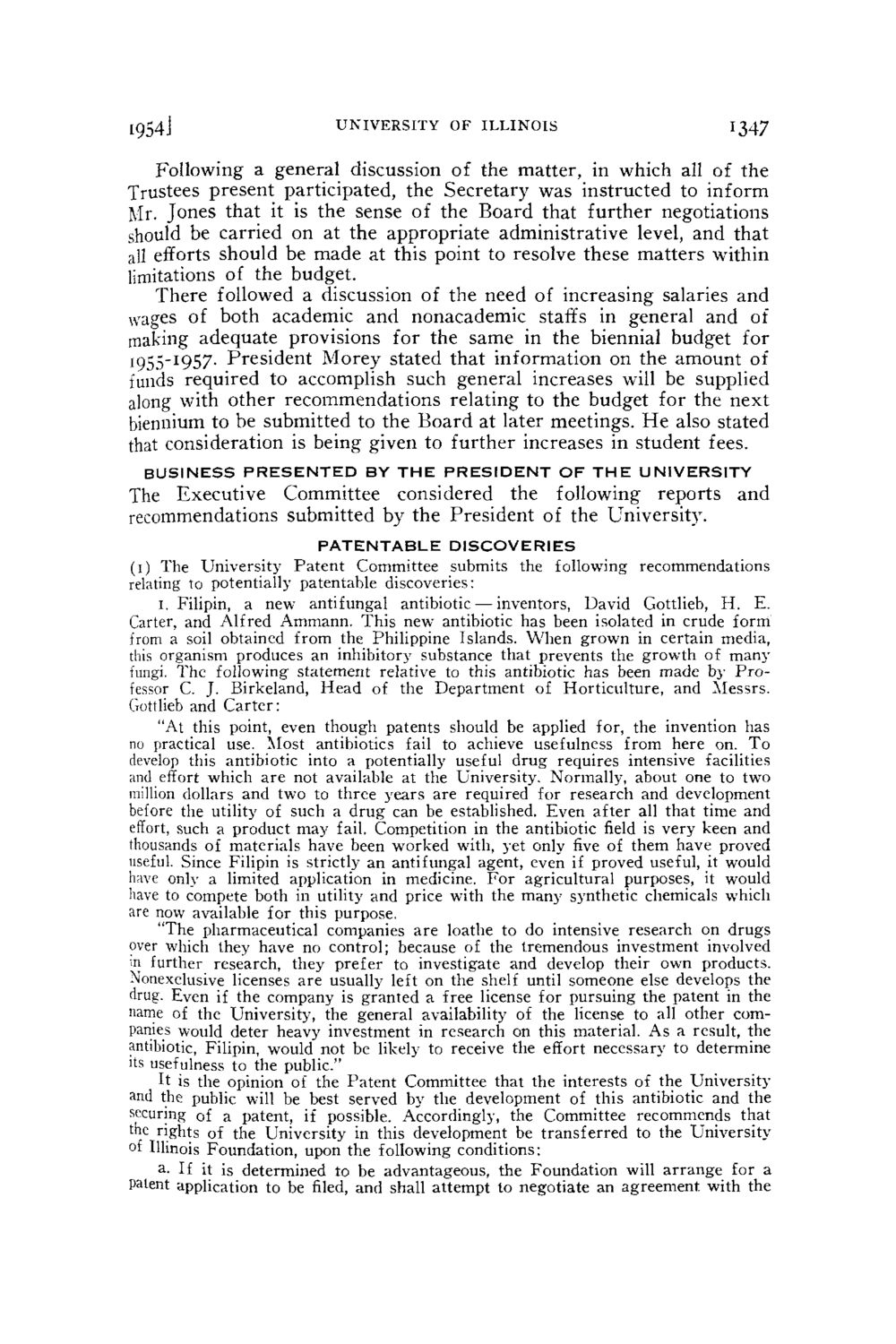| |
| |
Caption: Board of Trustees Minutes - 1954
This is a reduced-resolution page image for fast online browsing.

EXTRACTED TEXT FROM PAGE:
I954J UNIVERSITY OF ILLINOIS 1347 Following a general discussion of the matter, in which all of the Trustees present participated, the Secretary was instructed to inform Mr. Jones that it is the sense of the Board that further negotiations should be carried on at the appropriate administrative level, and that all efforts should be made at this point to resolve these matters within limitations of the budget. There followed a discussion of the need of increasing salaries and wages of both academic and nonacademic staffs in general and of making adequate provisions for the same in the biennial budget for 1955-1957. President M o r e y stated that information on the amount of funds required to accomplish such general increases will be supplied along with other recommendations relating to the budget for the next bienriium to be submitted to the B o a r d at later meetings. H e also stated that consideration is being given to further increases in student fees. BUSINESS PRESENTED BY THE PRESIDENT OF T H E UNIVERSITY The Executive Committee considered the following reports and recommendations submitted by the President of the University. PATENTABLE DISCOVERIES (1) The University Patent Committee submits the following recommendations relating to potentially patentable discoveries: I. Filipin, a new antifungal antibiotic — inventors, David Gottlieb, H . E. Carter, and Alfred Ammann. This new antibiotic has been isolated in crude form from a soil obtained from the Philippine Islands. When grown in certain media, this organism produces an inhibitor}' substance that prevents the growth of many fungi. The following statement relative to this antibiotic has been made by P r o fessor C. J. Birkeland, Head of the Department of Horticulture, and Messrs. Gottlieb and Carter: "At this point, even though patents should be applied for, the invention has no practical use. Most antibiotics fail to achieve usefulness from here on. T o develop this antibiotic into a potentially useful drug requires intensive facilities and effort which are not available at the University. Normally, about one to two million dollars and two to three years are required for research and development before the utility of such a drug can be established. Even after all that time and effort, such a product may fail. Competition in the antibiotic field is very keen and thousands of materials have been worked with, yet only five of them have proved useful. Since Filipin is strictly an antifungal agent, even if proved useful, it would have only a limited application in medicine. For agricultural purposes, it would have to compete both in utility and price with the many synthetic chemicals which are now available for this purpose. "The pharmaceutical companies are loathe to do intensive research on drugs over which they have no control; because of the tremendous investment involved in further research, they prefer to investigate and develop their own products. Nonexclusive licenses are usually left on the shelf until someone else develops the drug. Even if the company is granted a free license for pursuing the patent in the name of the University, the general availability of the license to all other companies would deter heavy investment in research on this material. As a result, the antibiotic, Filipin, would not be likely to receive the effort necessary to determine its usefulness to the public." It is the opinion of the Patent Committee that the interests of the University and the public will be best served by the development of this antibiotic and the securing of a patent, if possible. Accordingly, the Committee recommends that the rights of the University in this development be transferred to the University of Illinois Foundation, upon the following conditions: a - If it is determined to be advantageous, the Foundation will arrange for a patent application to be filed, and shall attempt to negotiate an agreement with the
| |